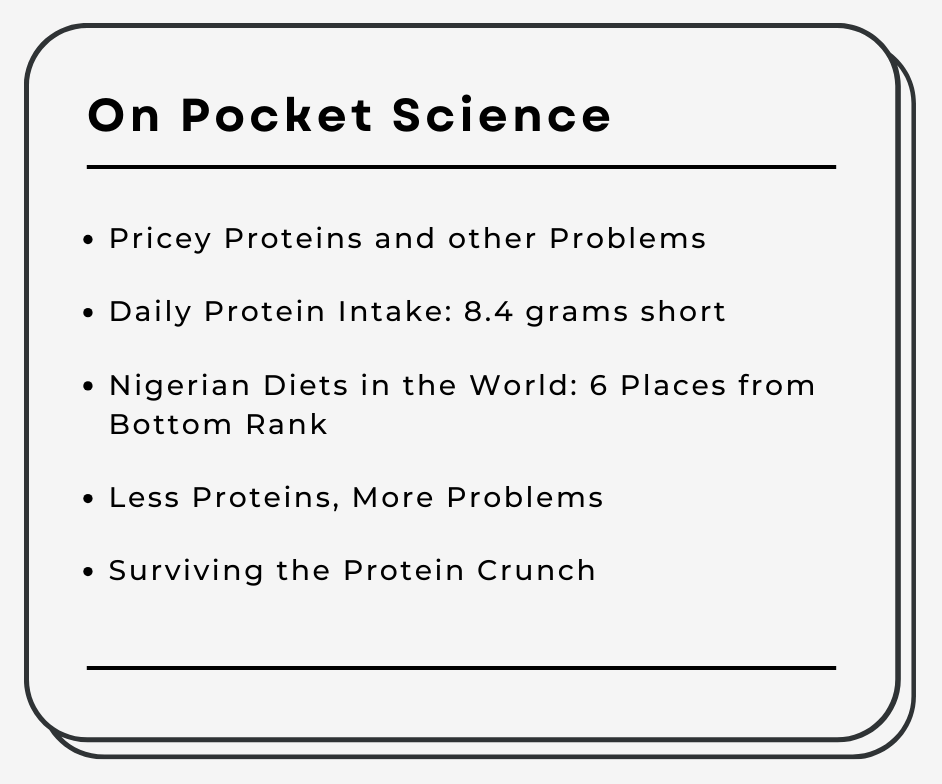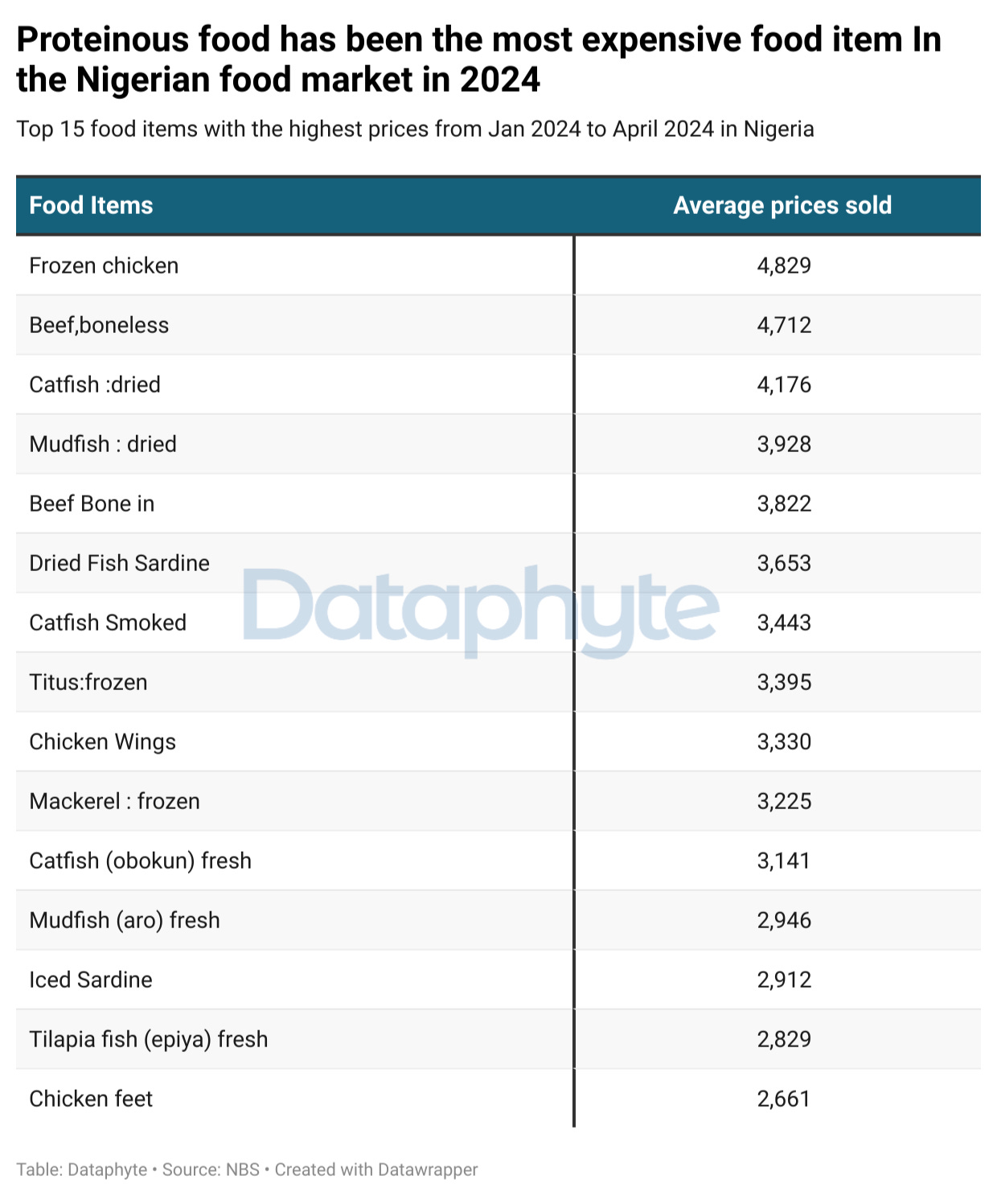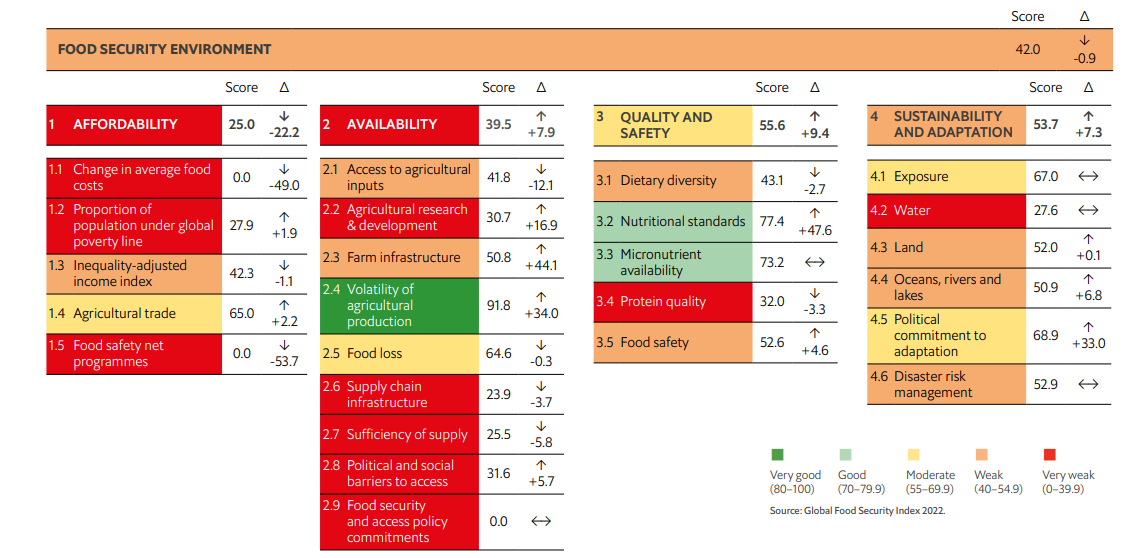Pricey Proteins and other Problems
In Nigeria, the top 15 most costly food items in 2024 are all protein-based. The National Bureau of Statistics data shows that the price hike of food staples is particularly more evident in proteinous foods.
This further indicates that people who already have little purchasing capacity will shift their priority from meeting their nutritional needs to eating just for survival and not to meet their health needs.
Protein products such as beef, chicken, fish, eggs, and dairy are crucial for a balanced diet. Their high prices may force many Nigerians to reduce their consumption of these essential foods and cause implications for nutrition and public health.
Daily Protein Intake: 8.4 grams short
The food items with the highest prices in 2024 so far are protein-rich products such as frozen chicken, various forms of catfish, beef, and other seafood.
Protein sources are becoming less available to a sizable segment of the population due to these high prices, with approximately 40% of Nigerians living below the poverty line.
According to the Global Nutrition Report, consumers with lower income levels tend to restrict their use of vital commodities when their prices rise, which results in an inadequate intake of critical nutrients.
The high cost of these protein sources indicates low price elasticity, where due to high prices, the demand remains relatively inelastic despite the essential nature of protein in diets as proven by the Nigerian Protein Deficiency Report (2020), which asserted that 45 per cent of the population, translating to 92.7 million Nigerians, do not consume protein daily as against recommended consumption.
The report further stated that the Food and Agriculture Organisation of the United Nations (FAO), recommended a minimum per capita daily protein intake of 53.8g, with a global daily intake of 64g. However, in Nigeria, the daily protein intake is 45.4g.
Nigerian Diets in the World: 6 Places from Bottom Rank
Nigeria ranks low on the Global Food Security Index (GFSI) 2022 with an overall score of 42, placing it 107th out of 113 countries globally and 25th out of 28 in Sub-Saharan Africa. The GFSI evaluates food security based on four pillars: affordability, availability, quality and safety, and sustainability and adaptation.
One key measure within the quality and safety pillar is protein quality. Nigeria's score for protein quality is just 32 out of 100, indicating that the nutritional quality of protein in the diets of Nigerians is very poor.
This low score highlights significant challenges in ensuring that the population receives adequate and high-quality protein essential for health and development.
Less Proteins, More Problems
Proteins are essential nutrients that keep your body running smoothly by helping it grow, repair itself, and stay healthy. They play a vital role in the growth and maintenance of muscles, skin, and other body parts.
Pregnant women and children are particularly vulnerable to the adverse effects of protein deficiency.
For pregnant women, sufficient protein intake supports the development of the baby and maintains the mother's health. For children, proteins are essential for physical growth and brain development.
In Nigeria, the high cost of protein-rich foods heightens malnutrition among these sensitive groups, leading to long-term health implications. Protein-rich foods such as meat, fish, eggs, and dairy products are often expensive, making them less accessible to many families, especially those with lower incomes.
Insufficient protein intake leads to Protein-Energy Malnutrition (PEM), characterised by various adverse effects. Children who do not receive enough protein suffer from stunted growth.
According to UNICEF, in Nigeria, 31.5% of children under five are stunted, indicating chronic undernutrition largely due to inadequate protein intake. This is the second-highest burden of stunted children globally.
Additionally, a lack of protein causes muscle wasting, where the body breaks down muscle tissue for energy, and a weakened immune system makes individuals more susceptible to infections.
Protein-rich foods are also important sources of vital micronutrients such as iron, zinc, and vitamins. The high prices of these foods contribute to widespread deficiencies, particularly iron deficiency anaemia.
In Nigeria, over 55% of women of reproductive age are affected by anaemia, which can lead to severe health issues including fatigue, weakened immunity, and complications during pregnancy.
Surviving the Protein Crunch
Protein is crucial for our health, but in Nigeria, it’s quickly becoming a luxury item. High prices, dependency on imported feed, fluctuating exchange rates, and local production challenges all contribute to this issue.
Here are some cheap, nutritious protein substitutes for vulnerable groups like pregnant women, children, and everyone else.
For Pregnant Women: Baby Builders on a Budget
Beans, eggs, and groundnuts are your possible options. These nutritional powerhouses are rich in protein and fibre, promoting your baby’s growth and keeping your energy levels stable. Beans can be used to make Nigerian dishes like bean porridge, bean pudding (moin-moin), bean cake (Akara) or Ewa Agoyin. Eggs are perfect for omelettes, and groundnuts can be transformed into peanut butter.
For Children: Growing Up Strong on a Budget
Small fish-like sardines are nutritious alternatives for kids, they are packed with protein and omega-3s. Plantains and beans, homemade yoghurt and cheese, or "wara," are also inexpensive and promote growth.
For Everyone Else: Protein-Rich on a Budget
For everyone else, beans, sorghum, millet, tofu, and soy products are protein-packed and budget-friendly. Beans can be used in a variety of dishes. Sorghum, millet, tofu, and soy milk are also fantastic, affordable options.
Hope you enjoyed this edition of Pocket Science. It was written by Khadijat Kareem and edited by Oluseyi Olufemi.






